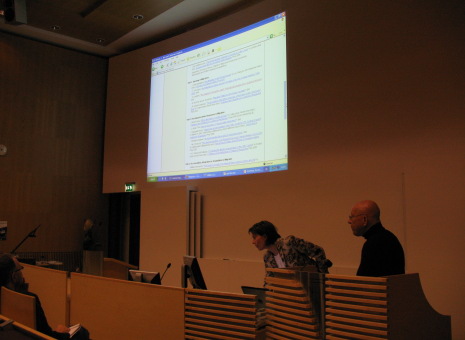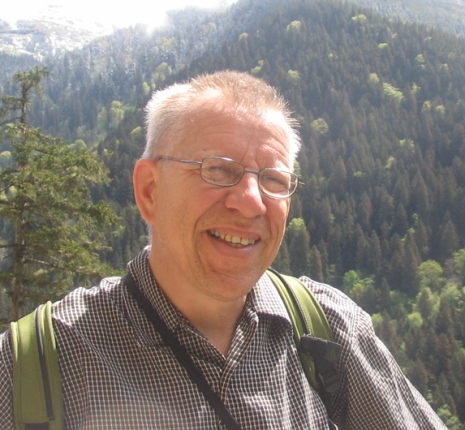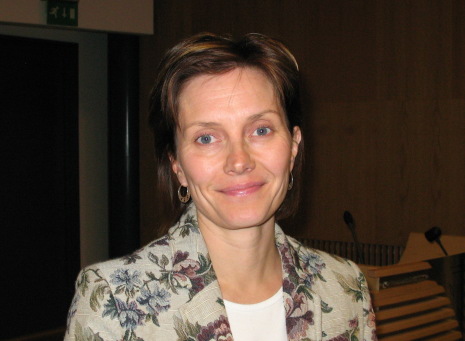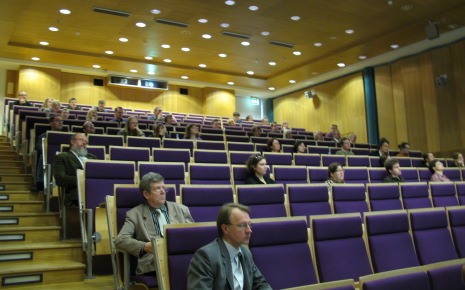This article can also be found in Finnish: CLIOHnet tulevan tohtorin asialla
Graduate students of history gathered together at Tampere to participate in the Annual Conference of the Finnish Doctoral School of History (May 21-22, 2008) where they could meet one another, participate in workshops and listen to keynote speakers. When grinding away at their dissertations, many graduate students also wonder about the future after receiving their Doctor’s degree. These future hopes and possibilities are mapped by, among others, the European Union-funded Socrates-Erasmus Thematic Network CLIOHnet (Creating Links and Innovative Overviews to Enhance Historical Perspective in European Culture). At present, 75 history departments from different parts of the European Union are involved in the project. In Tampere, CLIOHnet and its activities were introduced by the Finnish coordinators of the project, namely lecturer Seija Jalagin from the Department of History, University of Oulu, and Tapio Onnela from the Department of History at the University of Turku.

 Seija Jalagin and Tapio Onnela introducies CLIOHnet and its activities to graduate students of history.
Seija Jalagin and Tapio Onnela introducies CLIOHnet and its activities to graduate students of history.Jalagin and Onnela began their presentation by recounting the history of CLIOHnet. Collaboration among many history departments still involved in CLIOHnet began already in 1988-1989 with the ECTS pilot project. This project aimed towards standardising the university study attainments across Europe. The collaboration among the history departments that participated in the pilot project was later broadened to encompass other areas of collaboration and, simultaneously, the number of collaborating departments increased. However, CLIOHnet is not limited to the members of the European Union, or even the continent of Europe, but the aim is to expand the collaboration network outside the present area as well.
The CLIOHnet project develops constantly, and it already has a lot to offer to people working in the field of history. Worth getting acquainted with is for example the project’s Internet bookshelf that can be made use of in research and teaching alike. Another future undertaking worth mentioning is the expert database, which is currently in the planning stage. With the help of this database, researchers working in the same field of history can easily find one another. Universities, on the other hand, can use the database to find for instance both pre-examiners and opponents for doctoral dissertations. In addition to the other activities, both Jalagin and Onnela reminded that the project also makes it possible to engage in informal discussion with other experts in the field, the importance of which is considerable – many an important project has emerged from such discussions.

Since CLIOHnet has been created to meet the needs of the history departments, its aim is to actively map grass-roots level opinions. The coordinators in each country already gain lots of information through working at the history departments of their respective universities and therefore interacting with doctoral students, as well as through organising events and activities relating to CLIOHnet. For instance, in Finland information is gained particularly through the annual conference of the Doctoral School. In addition to this, CLIOHnet also organises large polls among for example graduate students, and these polls provide information and opinions about education and employment options in the field of history in the European Union. This in turn enables the network to meet the needs of teachers, students and researchers more readily. The polls have shown, for instance, that graduate students wish for a more multidisciplinary training and so-called “intelligent instruction”. Intelligent instruction refers to a mode of work where the attention is paid both to the student’s own work and to topical issues and the theoretical and methodological development of the field.
CLIOHnet is also an expert organ of the field of history in the Tuning project, which supports the Bologna process. The Tuning project aims to develop educational structures and the content of studies in higher education institutions within the entire EU in order to ensure the free mobility of both history students and graduates working in the field. Earlier, CLIOHnet was involved in the tuning of Bachelor’s and Master’s degrees. Now the question under consideration is whether and/or how Doctor’s degrees within the EU should be tuned as well, since they can be very different in each country. For instance, the amount of work required for the degree varies from country to country. One question that has emerged from this is whether the ECTS points currently used in Master’s degrees ought to be taken into use in Doctor’s degrees as well. This way it would be possible to evaluate the amount of work required both in parts and as a whole, and to compare the scopes of the degrees in different countries.
Seija Jalagin stated that the CLIOHnet project also wishes to discuss the employment possibilities of Doctors of History. The situation of history is the same as in other fields: there are more and more doctors graduating each year, and not all of them find employment that corresponds to their level of education.

CLIOHnet Raised Discussion at the Doctoral School Conference
The tuning of doctoral degrees attracted a lot of attention and raised much discussion at the May conference. The Head of History at the University of Joensuu, Jukka Korpela, expressed concern over the plans. He reminded that in the open employment market the required degree for most positions is a Master’s degree. In the academic world, on the other hand, it makes no difference whether the Doctor’s degree is standardised or not, because what is important is to do excellent research. Jalagin underlined that the purpose is to reform the degrees only in a structural sense. However, she considered it important to talk about how doctors who do not choose an academic career could be better integrated into the working life. Onnela pointed out that just as newly minted Master’s degree graduates, even doctors do not always seem to fully understand the actual scope of their know-how. Pertti Haapala, The Head of the Doctoral School, suggested that this could in part result from the fact that doctoral degrees in this field are very heterogeneous, which is due to the fact that doctors’ know-how is formed through their personal research interests.

 Graduate students of history listening the lectures. In the front row The Head of the Doctoral School, Pertti Haapala.
Graduate students of history listening the lectures. In the front row The Head of the Doctoral School, Pertti Haapala. Haapala stated that because of the heterogeneity of the degrees, it is very difficult to predict where or in what kind of a position a future doctor will be employed. At the same time he pointed out, however, that this situation is in no way negative in itself, since the doctors also meet unforeseeable needs in the society. Whatever the case, Anu Lahtinen, who was awarded her Doctor’s degree in Cultural History last spring, expressed a wish that the universities invest more in the doctors’ employment situation. Attention should be paid to it as early as in the study stage, and graduate students should be encouraged to gain also other useful skills for the purposes of the working life while working on their dissertations. The Professor in Finnish History of the University of Joensuu, Kimmo Katajala, pointed out that in Joensuu this is taken into consideration when selecting the graduate students. The students must themselves be able to formulate their career plans, and the supervisor and student together then use those plans to decide which skills the student should acquire or complement in addition to the actual research. Katajala emphasized the student’s own responsibility in this process. This was generally agreed upon, but supervision and advice were called for.
Haapala stated that because of the heterogeneity of the degrees, it is very difficult to predict where or in what kind of a position a future doctor will be employed. At the same time he pointed out, however, that this situation is in no way negative in itself, since the doctors also meet unforeseeable needs in the society. Whatever the case, Anu Lahtinen, who was awarded her Doctor’s degree in Cultural History last spring, expressed a wish that the universities invest more in the doctors’ employment situation. Attention should be paid to it as early as in the study stage, and graduate students should be encouraged to gain also other useful skills for the purposes of the working life while working on their dissertations. The Professor in Finnish History of the University of Joensuu, Kimmo Katajala, pointed out that in Joensuu this is taken into consideration when selecting the graduate students. The students must themselves be able to formulate their career plans, and the supervisor and student together then use those plans to decide which skills the student should acquire or complement in addition to the actual research. Katajala emphasized the student’s own responsibility in this process. This was generally agreed upon, but supervision and advice were called for.
The Head of the Doctoral School, Pertti Haapala, was glad that the School and CLIOHnet collaborate, even if the status and tasks of the organisations are different. At the Tampere conference the members of the Doctoral School became acquainted with the CLIOHnet project, and the CLIOHnet representatives in turn got to hear the grass-roots level opinions they were looking for. Feedback from the field is naturally important, since CLIOHnet is involved in many projects relating to Doctor’s degrees and can strive to answer for instance the following topical questions: What is the place and value of the Doctor’s degree in Europe? Where exactly are doctors needed outside the university? Should the researchers of history have a specific occupational title as distinct from amateur historians? Why are doctors not made more use of as experts in their respective fields?
The CLIOHnet web site can be found at the following URL:
http://www.clioh.net/
CLIOHnet and CLIOHres free downloadable material bookshelf can be found at:
http://www.stm.unipi.it/Clioh/tabs/core.htm
http://www.cliohres.net